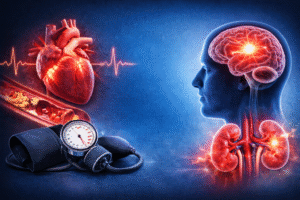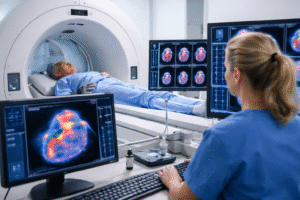What a Stress Test Can Say About Your Heart Health
An exercise stress test shows how hard your heart is working during physical activity. By making your heart work harder, this test can reveal abnormalities that may be vital for the detection and prevention of heart disease. Below, we will discuss the importance of stress tests and how they are administered by Dr. Sachin Diwadkar, FACC, FASE, and the team of cardiologists at Ascent Cardiology Group. If you are concerned with your heart health and wish to undergo a stress test, consult a specialist in interventional cardiology in Tampa from Ascent Cardiology Group.
What Happens During a Stress Test?
A stress test consists of attaching a heart monitor to a patient and having them walk on a treadmill. As the test progresses, the treadmill will incline and gain speed, similar to walking up a hill. The test continues until a target heart rate is reached. In addition to asking you how you feel during the test, a cardiologist will record your heart rate, breathing, blood pressure, and electrical activity of the heart. At Ascent Cardiology Group, we take this test one step further by also employing transthoracic echocardiography for quick and painless visualization of the heart. Using ultrasounds, this method allows us to immediately diagnose cardiac abnormalities that would otherwise go undetected.
Is a Stress Test Safe?
A stress test is relatively risk-free and only as dangerous as a bike ride or walk up a hill would be. Medical professionals are always on hand to ensure that patient safety is a priority and to stop the test if at any point you feel uncomfortable. Preparation for this test is also relatively simple. A cardiologist will ask that you wear comfortable clothing and shoes. They may ask that you forgo eating, drinking, smoking, or taking certain medicines before the test.
What Will a Stress Test Reveal?
Despite the simplicity of a stress test, it can provide your cardiologist with a wealth of information regarding your heart health. A stress test can be used to diagnose coronary artery disease or the underlying cause of chest pain, shortness of breath, or lightheadedness. It can even be used to discern a patient’s risk of a heart attack. Additionally, a stress test says how much exercise your heart can handle, an important piece of knowledge to have for creating an exercise regimen to manage the effects of heart disease. What can a stress test say about your heart health? Quite a bit.
Have an Interventional Cardiologist Administer Your Stress Test
What a stress test says about your heart health is important because a central component of interventional cardiology is using preventative measures and minimally invasive techniques to treat heart disease. If your cardiologist can determine how much your heart can handle, they can determine how best to proceed with medical treatment. If the results of your stress test are of concern, your cardiologist may recommend cardiac catheterization, an advanced procedure to diagnose and treat conditions of the heart.
When in search of the best interventional cardiologist in Tampa, turn to a cardiologist who can not only administer your stress test but who also possesses the medical knowledge and expertise to develop the appropriate treatment plan following your test. Dr. Diwadkar is certified to perform all forms of echocardiography and stress testing.
When in search of the best interventional cardiologist in Tampa, turn to a cardiologist who can not only administer your stress test but who also possesses the medical knowledge and expertise to develop the appropriate treatment plan following your test. Dr. Diwadkar is certified to perform all forms of echocardiography and stress testing.
To consult the best interventional cardiologist in Tampa, from Ascent Cardiology Group, please request an appointment today.
Disclaimer: The contents of this website are for general educational purposes only. All content and media on the Ascent Cardiology Group website does not constitute professional medical advice nor is the information intended to replace the services of Ascent Cardiology Group or other qualified medical professionals. If you believe you are having a medical emergency, call 911 immediately.
The content, views, and opinions communicated on this website do not represent the views of Ascent Cardiology Group. Reliance on any information provided by this website is solely at your own risk. Although this website contains links to other medical websites, this is strictly for informational purposes. Ascent Cardiology Group is not responsible nor do they approve of the content featured on any third party linked websites referenced on this website.
The content, views, and opinions communicated on this website do not represent the views of Ascent Cardiology Group. Reliance on any information provided by this website is solely at your own risk. Although this website contains links to other medical websites, this is strictly for informational purposes. Ascent Cardiology Group is not responsible nor do they approve of the content featured on any third party linked websites referenced on this website.
More Resources

How High Blood Pressure Affects Your Heart, Brain, and Body
High blood pressure—also known as hypertension—is one of the most common and dangerous cardiovascular conditions worldwide. Often called the “silent

Stress and Heart Disease: How to Protect and Improve Your Heart Health
Chronic stress is increasingly recognized as a major risk factor for cardiovascular disease. Many high-performing, Type A individuals juggle demanding

What Is Nuclear Cardiology? Tests, Benefits, and What Patients Should Know
Nuclear cardiology is a specialized field of cardiovascular medicine that uses safe, low-dose radioactive tracers combined with advanced imaging technology